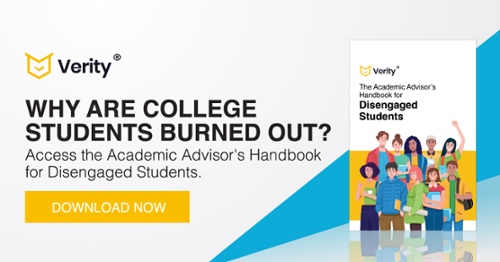10 Questions to Ask College Students About Their Experience
Over the course of the school year, it can be easy to fall into a rhythm where communication is happening in primarily one direction: the school sharing information with its students.
From event announcements to deadline reminders and everything in between, there’s so much communication happening and it’s primarily moving in one direction. However, it’s super important to break that trend and make sure that communication at your institution is moving both ways.
Checking in and asking for feedback through a schoolwide survey is important not only to give your students a voice and platform but also to improve your school.
It can be humbling to ask “What can we do better?” but it’s critical for growth and improvement.
As you ask your students for feedback, be as specific as possible with your questions so that you get actionable insights that can drive positive change.
Here are 10 questions to ask your students to get a sense of where they are, how they’re doing, and what you can do to support them better.
10 Questions to Ask Students at Your Institution
1. What courses are you most excited about and why?
This question gives the students a chance to talk about something they’re excited about. If you’re able to ask this question in person, their face will usually light up when describing their favorite class.
Pay close attention to the “why” in their response. Is it the topic? The reading material? Their instructor? The classmates they share it with? The time and/or location of the class? And, is the course part of their major coursework or not?
2. What environments are enabling you to do your best work as a student?
The answers to this question will likely either be very general or very specific. They might respond with a specific location, such as a corner desk in the basement of the library.
Or, they might respond with something more about the atmosphere, such as studying surrounded by friends or with a favorite snack from the dining hall.
Either way, look for patterns in these responses and find ways you can create more situations where students can do their best work.
3. What communication channels do you most prefer for engaging with faculty or staff? What about with other students?
We know that everyone has different preferences for communication. Some people may prefer to engage with the school through email, others through SMS text, while many prefer a blend across multiple channels.
That’s why it’s super important to create a multichannel communication strategy that leverages different platforms such as email, text, voice, chat, video, and even VR (Higher Ed institutions should be on the Metaverse).
Note the differences between how your students prefer to communicate with faculty/staff vs. with their peers. What insights can you pull from this?
4. If you could change one thing about the institution, what would it be?
This is an important question to ask, but of course, the range of responses will be wide and varied based on student interests and experiences.
While some of these responses could be pie-in-the-sky requests, this question will give you insight into what students value most and what their biggest pain points are. If improving college student engagement is your end goal, this is a great question to ask.

5. Would you recommend our school to your friends from high school? Why or why not?
As with many of these questions, the key thing to look for here is the “why.”
Really, this question is gaining insights into:
- What their satisfaction level is with the school
- What they like most about the school
- What creates the most frustration for the students
6. What letter grade would you give the institution for the process of (blank)?
Fill in the blank with a specific area, especially one that you think needs improvement. This may include processes like class scheduling, event registration, or scheduling meetings.
This is a great way to crowdsource your strategy for improving operations at your school while improving the student experience.
Are You Providing a Stale Student Experience? Here's How to Tell
7. How has the school prepared you for the future?
Students could take this question in a very practical way: are they prepared to enter the job market?
They could respond about important things like learning valuable skills, building a resume, practicing interviews, and more like that. These are all things that college students need.
However, they may also answer with something more subjective and personal, especially if they’re studying something that they’re passionate about and following their dreams. All answers are welcome!
8. Do you feel supported here?
This is a great way to see how your students view the level of support they’re getting in terms of faculty, their academic advisor, and whatever resources your school offers to students who need extra help.
It’s also a good way to gauge the sense of community among students and how they collaborate with and help one another. Do they feel like they’re in a supportive environment?
9. Have you built personal connections with the faculty?
Forming relationships with faculty and instructors is a strong indicator of student success, so this is a great question to ask. The more that students connect with faculty, the more likely they’ll be successful in that class.
But remember this: the responses you get say just as much about the faculty as they do about the students.
10. Do you feel that what you’re learning now will be helpful five years from now?
Of course, you really have to pay close attention to the student’s program of study when reading their responses. If it’s a field like computer science, which is highly technical and rapidly changing, then there may be the expectation that some specific elements will no longer be relevant in 5 years, and that’s okay.
Beyond the hard skills and knowledge specific to the subject matter, focus on soft skills that have wide applicability, like communication, research, writing, reading, and public speaking.
How to Gauge Student Happiness on Your Campus
These questions are a great building block for checking in with your students over the course of the school year. Of course, you should feel free to tweak the language to make it your own and address whatever topics are important at your institution.
Oftentimes, students can tend to focus on being critical, especially when you consider how busy they are and the stress they may be managing. So, timing is important and while it’s important to be transparent, try to spin the questions toward optimism when you can. This can play a huge part in college student retention.
If you feel like there’s a problem area at your school, there probably is. Getting student feedback is a great way to put a finer point on the issue. And remember, take their answers seriously!


